- Toastmasters →

Toastmasters Evaluator Tips & Winning the Speech Evaluation Contest
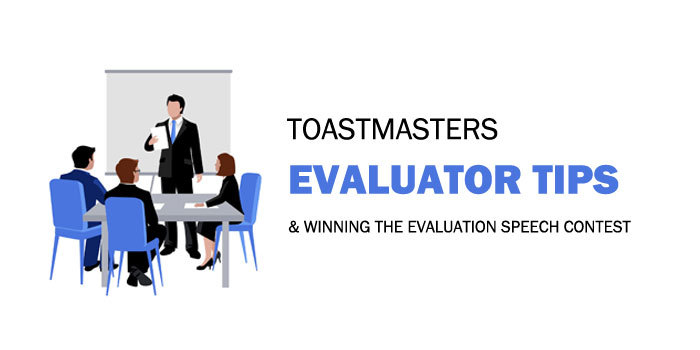
If you’re looking for tips on how to be a better Toastmasters evaluator, you are at the right place.
I have compiled a list of my best speech evaluation tips that I learnt from workshops, mentors and courses over the years.
Whether you are a new Toastmaster starting your evaluation journey, or an experienced one looking to win the speech evaluation contest, this guide is for you.
The first part covers general tips on being a more effective evaluator in a Toastmaster club meeting and the second part covers tips for winning the evaluation contest.
Why Give Evaluations?
In Toastmasters, the way we learn to be a better speaker is by listening to other members’ feedback. The closest thing to a teacher is an evaluator.
We get immediate feedback on where we did well and how we can improve.
By giving evaluations , you not only help the speaker, you help the audience members learn and more importantly, you help yourself.
Before you could suggest something, you have to be clear on it yourself. And by being clear, you improve.
The 2005 World Champion of Public Speaking Lance Miller said:
I am a firm believer that if you want to be an excellent speaker, you have to be an excellent speech evaluator. You cannot do one without the other."

Lance Miller
Giving evaluations is a real-world skill as well.
How many times do you have to give feedback in your professional and personal life?
Pretty much everyday if you work with people or have children.
You can give feedback and be met with resistance or you can learn to give feedback that encourages the other party and have him accept your feedback openly.
Let's start, evaluators.

How to Be an Enriching, Encouraging and Effective Evaluator
Share the what, how & why.
When you comment on something, do not just mention the WHAT and move on to the next point.
For example, “you have good vocal variety.”
That alone doesn’t mean anything. Share how he demonstrates good vocal variety and why it matters.
- (WHAT) You have good vocal variety.
- (HOW) You raised your voice and spoke faster at the exciting parts of your speech, and you slowed down and lowered your voice at the serious moments.
- (WHY) When you do this, it breaks our patterns and holds on to our attention for the entire speech.
In this example, the benefit is: holds on to our attention for the entire speech.
You can be more specific and share the exact moments he does these. For example, “...at the exciting parts of your speech, like when you went to Disneyland with your family”.
Or “...at the serious moments, when your grandmother went to the hospital.”

This is even more important when you recommend an area of improvement.
Let’s say you want the speaker to have stronger eye contact . You could say:
- (WHAT) I feel that you could have a stronger eye contact.
- (HOW) I noticed that you spent a huge amount of time looking at this side of the audience. I cannot blame you; there are beautiful ladies here.
- (WHY) The audience sitting on the other side may feel a little bit neglected.
- (WHAT) What I would suggest is that you spread your gaze across the whole auditorium.
- (HOW) Look at each person in the audience as long as you need to make a point. It could be 1s it could be 5s.
- (WHY) By doing so, you would have built a stronger connection with the entire audience .
If you noticed, when giving a recommendation, you’d need to point them out twice. First, what they did and why it’s not good; and what they can do, how they can do it, and why it’s better.
If there is not enough time, you may exclude the first part (what they did) and go straight into the suggestion.
Evaluate the Speech, not the Speaker
As a project evaluator you should be evaluating the speaker’s speech crafting, the speech structure , speech value, speech logic, project objectives and his delivery.
You do not want to evaluate based on your feelings of the speaker.
- Don’t like the speaker? His speech sucks.
- Pretty or handsome? More positive remarks.
- Dress well? Plus points.
You also do not want to evaluate based on your opinions of the speech subject. (I don’t agree that global warming is a threat.)
Be objective, take your feelings out, and help the speaker.
Mix Suggestions on Delivery and Speech Logic
Every speech consists of two parts: the speech itself and the speaker’s delivery.
The speaker may have crafted a perfect speech, but if his delivery is terrible, then the speech would not reach the audience’s mind and heart.
The speaker may be a great speaker, but if his speech is poorly-organized, the audience may be left confused.
Try to comment on both aspects.
Here are some parts of the delivery: vocal variety, pauses, body language , gestures, stage movement, eye contact, energy, props, dialogues, powerpoint slides, audience engagement.
For the speech logic : use of stories, a message, call-to-action, structure, humour, presentation of data, rhetorical devices, language, relatability, topic selection, speech purpose.
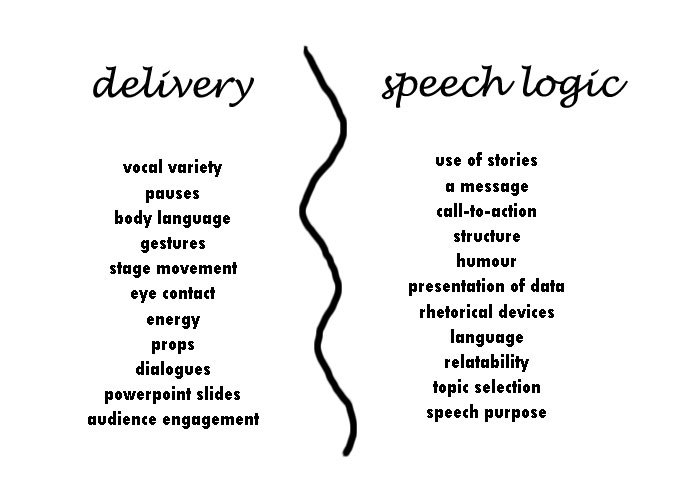
Have a Cheatsheet
See that list of things to look out for above?
You can literally prepare what to say about each point on the list. Prepare a “what I like” and a “what can be improved” about each point. This is your evaluation cheatsheet.
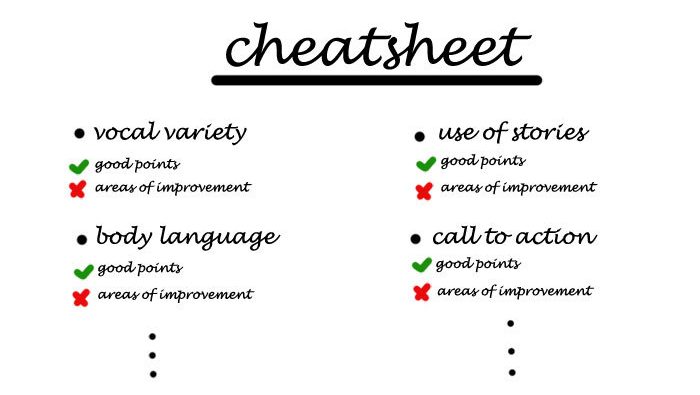
Have the templates ready so that during the speech, you can simply tick off the boxes, extract it from your cheatsheet, and include it in your evaluation.
This one tip is gold. It helped me to win many “best evaluator” ribbons and improved my evaluation skills exponentially.
Do not Whitewash
Yes, in Toastmasters we try to be as encouraging as possible so do point out their strengths. But no one is perfect. We all join Toastmasters because we want to improve.
Imagine your evaluator only praising you without offering any areas of improvements.
How do you know what to work on?
Many new evaluators have this issue as they don’t know what suggestions of improvements to give.
Are you telling me that speech you just evaluated is a World Champion calibre speech?
Even World Champions can be better.
In my experience, if the speaker’s delivery is superb, it usually boils down to content.
Maybe they lack a strong call-to-action? Or could it be more direct and specific?
Perhaps there’s a sudden jump in the story from difficulty to success, without a transformation or resolution?
Maybe they have a weird gesture that is a habit? Point it out to them. A DTM once told me that a first-time evaluator pointed out his unique gesture that he hadn’t noticed before.
Sometimes, we need a new perspective from a fresh pair of eyes.
Do not Blackwash
Similarly, do not only offer suggestions to improve. We want to encourage the speaker, however bad they may be - right now.
One single evaluation could end a speaker’s will to continue his Toastmasters journey .
Afterall, the speaker has put in the effort to prepare his speech and stood up there courageously to deliver it.
At the very least, praise their effort or courage. Remember, we want to point out their strengths so that they know what to continue doing.
Many speakers will tell you to only say what to improve, but they forgot that evaluations are not just for the speakers; they are for the audience to learn as well.
So, point out their strengths and share WHY it matters, so that the other members of the audience may learn from it as well.
Be Tactful with Your Words
Related to the previous point, in Toastmasters we learn to share our opinions in a way that encourages the speaker.
Avoid using negative words. Instead, say how something they did could be better.
For example, instead of saying, “You have weak eye contact”, say “I feel that your eye contact could be stronger.”
“You are monotonous” can be “I feel that you could add more variety to your voice. At the exciting parts of your speech, you could raise your voice and speak faster to demonstrate excitement.”
One way to be tactful is to change the BUTs to ANDs .

The moment you say BUT, the speaker only focuses on what comes after BUT - the negatives. Use AND and they remember both.
“Your speech is great BUT it has a weak conclusion” would be “Your speech is great AND it would be even better if you added in a strong Call-to-Action”.
Don’t say ‘Should’ or ‘Must’
Evaluation is simply your opinion. No one’s opinion is entirely correct - that would be a fact.
There is no right or wrong in a speech, just your thoughts and feelings on how it could be better.
Instead of saying, “you should do this”, you could say “I feel that you could do this”, or “my suggestion is to do this”.
Similarly, there is no “must” or “never”.
“You might want to consider not doing this because…”
There are no absolutes in a speech.
Speak Only From Your OWN Opinion
Do not speak for everyone in the audience.
You may think that the speaker could work on his eye contact, but another audience member may think he has strong eye contact.
You may like his animated gestures , but another person may think that’s too much acting.
You may think his voice is soft, but another could think he is loud and clear.
Use words like “I feel”, “In my opinion”, “My suggestion”.
Do not say “Everyone thinks” or “We all feel that…”
Do Not Repeat the Speech
Many evaluators like to recap the entire speech and I don’t know why.
Firstly, you’re wasting precious time.
Secondly, the audience literally just heard the speech and don’t need the recap.
It’s okay, though, to recap certain parts if it’s related to your point.
For example, if the speaker used 3 stories in his speech, you could say: “I like that you used stories in your speech; when you shared about your time in Singapore, your time in the USA and your time in Europe.”
It’s also acceptable, and even expected, to point out certain phrases or quotes that the speaker used that made an impact on you or added points to his speech.
But do not repeat the entire speech.

Evaluate Based on Speaker’s Level
You’d want to tailor your evaluation based on the speaker’s experience.
For a new speaker giving his icebreaker speech , you’d want to point out his strengths and comment on the structure of his speech.
Let him know if he looks confident, if he is prepared, if his words are clear or if the speech is well-organized.
Try not to comment on his lack of vocal variety or body language as these are the objectives of later projects and they will learn about it later.
In the old legacy manual, 'Understanding Body Language' is Project 5 and 'Vocal Variety' is Project 6. You wouldn’t expect a new speaker to master all these, would you?

In my opinion, things like the structure of a speech, a strong opening and closing and having a message is something that all speeches should have.
Point these out!
Be as encouraging as possible for an icebreaker speech.
When evaluating a very experienced speaker, I feel that it is more about pointing out the blind spots that he might have; like the aforementioned weird gestures.
Also, it is more about going deep on a couple of points rather than covering many points.
Maybe the speaker is BOTH the protagonist AND the saviour in his story?
Suggest to him to tweak his story so that someone else is the mentor or saviour that helped him overcome his difficulties. When he does this, it makes it easier for the audience to relate to him because then, he would appear to be just human - like the audience - and not a superhero.
To be able to suggest something like this, you’d have to be very familiar with the structure of the Hero’s Journey.
That is why being a good evaluator will make you a good speaker.
Get Feedback
What gets measured, gets managed.”

Peter Drucker
How do you know if you did well?
You could ask the audience or have a mentor let you know. You could even have an evaluator for your evaluation.
But the best way is to ask the speaker if your evaluation is beneficial and clear.
Ask if he feels insulted or motivated.
That would tell you if you need to be more tactful or choose your words better.
Read the Manual or Pathways Guidelines
Reading the guidelines gives you a lot of content to work with.
You’ll understand the speaker’s objectives and why he does certain things.
If you’re at a loss for words, the manual gives you leading questions that you can use to structure your evaluation.
You’ll also find things to comment on just by reading the guidelines.
Once, I had to evaluate a speaker who was doing the project ‘Managing a Difficult Audience’. To be honest, I had no idea how to manage a disruptive audience.
The project guidelines literally told me (or rather, the speaker) what to look out for:
From the 'Managing a Difficult Audience' Guidelines:
For a Talker, target questions to other participants by name and avoid making eye contact with the Talker after asking a question.
For a Chatterer, stop talking and look at him until he keeps quiet or invite him to share his discussion with the group.
For an Arguer, find merit in one of the Arguer’s comments, express your agreement, and move on.
Once I read these points, I was able to point out whether the speaker does all these and to suggest these actions if he didn’t.
Before the meeting starts, find out what project the speaker is attempting, and search for the guidelines on Google. There are many PDF versions available.
You can even do it during the meeting. No excuses.
Ask for the Speaker’s Goals
A speaker may care about his speech crafting and delivery more than the project objectives.
Before the meeting starts, ask the speaker: “Is there anything you’d want me to look out for?”
Some may tell you, nope, just evaluate generally. Then, you evaluate based on the objectives.
Some may tell you to look out for certain aspects, like his stage control or vocal variety. So, look out for these.
These may not be the objectives of the project, but it helps the speaker to improve his speaking skills . Afterall, an evaluator’s main purpose is to help the speaker.
Of course, you should also point out how he did in relation to the project objectives.
Plus, it gives you more content to work with.
If you have time left, throw in an additional point: “Before your speech, you asked me to look out for your vocal variety. I feel that...”

It is Not About You
I’ve heard evaluators go on about their own experiences with the speech topic .
“Your story reminds me of the time I was in the military. We sang in the morning, marched in the afternoon and worked out at night…”
They spent half the evaluation talking about themselves and nothing about the speech. Remember, your goal as an evaluator is to add value to the speaker and the audience.
You can, and should, add in a short 10-15s preamble about the speech or the speaker to break the ice and build some rapport , but that’s it.
“Don’t worry, I won’t become your drill sergeant and tell you that my grandmother can speak better than you. *laughs* What I like about your speech is that like a platoon of soldiers, it is very well-organized.”
Have a Speech Structure
An evaluation is a speech and like all good speeches, there should be a speech structure.
More specifically, there should be an opening , the main body and a conclusion.
As Dale Carnegie said it best:
Tell the audience what you're going to say, say it; then tell them what you've said."

Dale Carnegie
The common mistake many new evaluators do is to go back-and-forth between good points and recommendations.
It is difficult to follow.
Make your speech structure clear. You can do so with a simple sentence:
“I will be evaluating your speech based on what I thought were some great points, and what I felt could be improved.
“I will be using the acronym ABC to evaluate your speech.”
Present a well-organized speech evaluation. To do that, you'll have to...
Develop Your Own Writing Style
I used to write down everything and anything I could think of and the paper looked very messy.
There were arrows all around; from the top to the bottom, from the left to the right.
There were circles and stars and too many cancellations.
It was a beautiful chaos.
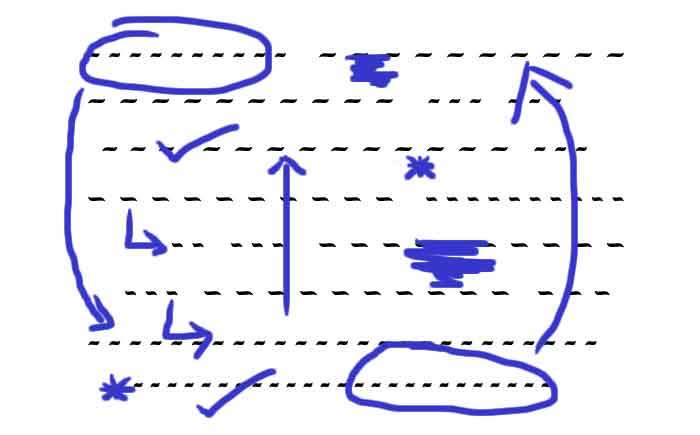
Needless to say, it didn’t work out too well for me.
There are many evaluation templates online and my suggestion is to try it all, then pick one that suits you best.
My friend uses the 6-pack template where he splits the paper into 6 sections and he always has a witty opening, 4 main points, and a resounding conclusion.
Another template I once saw was the House Template, where you split the evaluation sheet into the shape of a house. You start at the bottom (the foundation) and end with the climax (the roof).
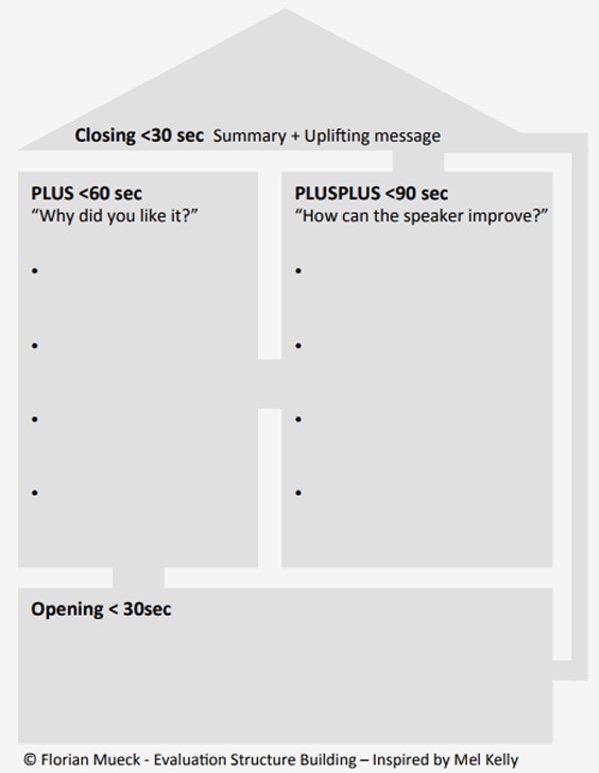
Another suggestion is to split the paper into 4 quadrants: general observations, what you liked, areas of improvements and the climax or what made the speech great.
I split my paper into 3 sections. One half for jotting down the content flow of the speech. One quarter for the positive points and another quarter for the areas of improvements.
I’ve seen some evaluators filling up the Pathways evaluation form and writing full sentences during the speech. I wouldn’t suggest it as I think you’d miss some important points but if it works for them, it works for them.
There is no right or wrong. Develop your own style.
Use 3rd Person Language
A 12-year Distinguished Toastmaster cum District Club Growth Director from New Zealand once told me to remember the word: Share .
When giving an evaluation, you should be sharing with the audience, not just to the speaker.
Instead of saying, "You have great eye contact," as you speak only to the speaker, share it with the audience.
"Ladies and gentlmen, Peter demonstrated great eye contact when he looked us in the eyes..."
I admit, sometimes I still forget about this point. My District's culture has always been to use 2nd person language for speech evaluations.
My suggestion:
To use both 2nd and 3rd-person language.
- When sharing the WHAT - direct it to the speaker.
- When sharing the HOW - direct it to the audience, so that everyone knows how to do it.
- When sharing the WHY - direct it to both the speaker and the audience, but more to the speaker.
For example:
- (WHAT) Peter, I like that you had great stage presence and you moved around with purpose.
- (HOW) Ladies and gentlemen, when Peter shared about his childhood, he was standing on the left side of the stage. During his high school period, he moved to the center. And when he shared about his working life as an adult, he moved to the right of the stage.
- (WHY) When he does this, he brought us all along on a journey, and he moved around with a purpose, without being distracting at all.
- (WHY) But more importantly, Peter, when you did this, you brought yourself closer to all of us and included us all in your speech. Great job!
Remember the word: Share .
Do Not Number Your Points
Let me clarify:
You CAN number your points on your evaluation sheet. And you should number them to be organized.
But you do not want to say:
“I will split my evaluation into 2 points that I liked and 3 areas of improvements.”
The moment you say a number you are putting yourself in a trap.
What if time runs out and you are only on point number 2, but you mentioned you have 3 areas?
You are discrediting yourself.
Instead, just say “ some areas I liked and some areas of improvements”.
Funny story: I made this mistake once. But instead of running out of time, I had more time left. After giving 2 areas of improvements, I said “As a bonus, I have one more suggestion for you.”
Write down as many points as you can but select just the top 2 or 3 points for the positives and negatives.
You can always share your observations with the speaker privately.
Don’t Say Something that They Can’t Change
I think this is obvious but I still see evaluators making this mistake.
Don’t tell them to change their accent .
Don’t tell them to change their looks.
Don’t tell them to change their clothes - unless it is a costume.
This goes back to a previous point:
Evaluate the speech, not the speaker.
Tips on Winning the Evaluation Speech Contest
Just by applying the above tips, you will be a great evaluator.
However, a contest setting is slightly different and you will be judged not only by your content, you will also be judged on your delivery.
The following tips will help you edge out your competitors in a contest . Take note that all tips above apply in a contest.
I aim to be as honest as possible and share all that I know. You may not agree with some of the points, and I don’t blame you.
I learnt the following tips from conversations with friends, mentors, workshops and Youtube videos by Loy Machedo and Jonathan Peng, among others.
Here is a great video by Loy Machedo. It is pretty long so I will summarize parts of it in written form.
Remember that an Evaluation is also a Performance
Like all speeches, especially in a contest, an evaluation speech is a performance.
That means you will be judged on your delivery as well as your content.
I’m not suggesting that you compromise on your content (it is still most important), but your mindset has to shift from “giving as much value as possible” and “helping the speaker” to “how can I deliver in a way that adds point to my speech”.
Your body language, stage presence and how you impress the audience matter a lot.
Some of the ways you can add points to your speech are to engage the audience , to have a themed evaluation, to use memorable acronyms, to include humour. (More on these later)
You may have to reduce the number of suggestions to have time for these bonus points.
See, I warned you that you might not agree with these points.
Focus on Judges, not Audience
There is a judging criteria and you’d want to study it.
Judges, technically , must follow the criteria and give you a score based on how well you fulfill the criteria.
Take a look at the criteria and you will notice that 70 points is on content (analytical quality and recommendations), 15 points on techniques and 15 on conclusion.
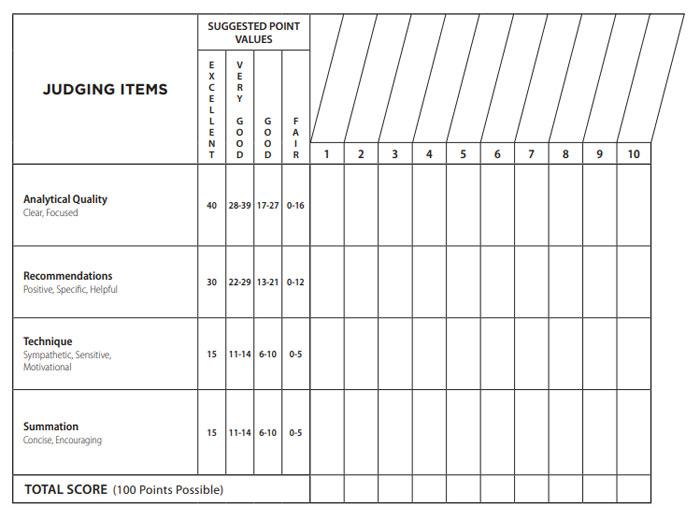
Let’s face it:
At a contest, everyone’s content is at a pretty good level. Every contestant will more or less suggest the same few things.
Now, I mentioned “technically” because not all judges will rank you based on the criteria. Judges are humans after all. Emotions get involved.
Which is why your technique is important (look back to the previous point). If you can impress the judges more than other contestants could, you win.
But more importantly, how you treat the judges is equally important.
At the area or club contest, it is pretty obvious who the judges are. At the higher levels, you’re out of luck.
Go club visiting regularly and be nice to everybody. Ask for advice from people. Be a PR agent. You never know who might be a future judge.
I once met someone at the toilet before the contest who later turned out to be a judge. Thankfully, I did not mistreat him.
Play on Emotions
Related to the previous point, Loy Machedo shared that there will always be a bias in the judges.
If you’re young, don’t be cocky. Don’t “act smart”. Stay humble.
If you’re more mature, look the part, suit up and enhance your maturity.
Don’t present yourself in a way that rubs people the wrong way.
This is controversial but I feel that I should point it out: Loy shared that he once told a handicapped contestant to play the sympathy card. He acted pitiful on stage, capitalized on his handicap and he won.
I prefer to win based on ability, but remember, judges have emotions too.
Remember to Conclude
Notice that in the judging criteria, 15% goes to the conclusion.
I have seen so many promising winners lose because of this.
They presented a humorous, themed evaluation, engaged the audience and impressed the judges, but they forgot to conclude.
When the results came out, many people wondered why they lost.
This is why.
A conclusion doesn’t have to be fancy; a simple sentence will do.
“All in all, I feel that you have…”
“To conclude, remember…”
“In summary, you are a great speaker because…”
Then say what you have said in point form.
Use the words “conclude” or “summary” if you worry that judges might not catch it.
Practice having a conclusion in every evaluation you give in normal club meetings just to develop the habit.
Have a Unique Positioning
Which would you remember better:
1 pink elephant or 8 grey elephants?

Ok, that example might not be realistic but you get the idea.
If there are 10 constants and if you say the same thing as everyone else, how would anyone remember you?
Be unique.
Most people use the same structure: what they liked & what could be improved.
Do something else. Use your name as an acronym, have a theme, or get the audience involved.
All these were used by past evaluation champions of District 80. One even paid homage to the nation by using the acronym SG 50 - the year Singapore turned 50.
Dress differently. If everyone wears a black suit, wear a maroon suit. (Good luck with this as more and more Toastmasters start wearing suits of all colours.)
Skip the obvious observations you know everyone talks about; like the vocal variety and body language. Offer some deep insights on the persuasion techniques used or the Hero’s Journey.
Make use of the entire stage. Stand out with your stage presence.
Being unique is especially important if you are the last speaker.
Subtle Authority Positioning
Confidence is a huge factor in contests.
Have an aura of confidence and authority. How?
Psychologically, believe you deserve to win.
Physiologically, stand tall, have poise, and own the stage.
Phrasally, use sentences like:
“I will give you a few ‘more advanced pointers’; both for you and the audience.”
“This is something that I noticed 80-90% of speakers do, including advanced speakers, so watch out…”
Sometimes, the mere fact of you contextualizing what you are going to say will make the audience believe that it is really an advanced pointer.
The most important thing is to say it with certainty.

Watch Your Tonality
To present yourself as an authority, you’d want to speak with a downward inflection tonality.
Not all the time, but in general.
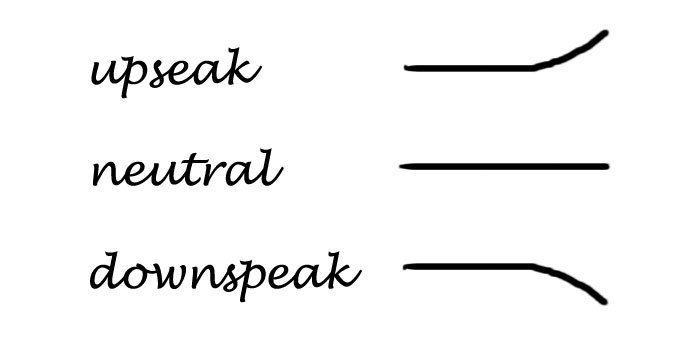
Studies have shown that people who speak with an upward inflection at the end of their sentences tend to be appear less confident and uncertain.
Would you believe an evaluator who sounded unsure?
The judges wouldn’t, as well.
You could also consider varying your pace and adding pauses to build up suspense and hold people’s attention.
Remember: an evaluation is a performance and vocal variety enhances a performance.
Get Audience’s Involvement
A sure way to stand out from the crowd and ‘wow’ the audience is to involve the audience.
The most common way to do that is, of course, to ask questions and get them to reply.
“Ladies and gentlemen, what could the speaker have done even better? Are you curious to hear about it?”
Besides questions, you can tell the audience to do something.
“Say yes if you learnt something from the speaker.”
“Show him a thumbs up if you think he did a great job.”
“Give her a heart if you liked her speech.” - followed by showing a Korean heart sign using your thumb and index finger.
Warning: when you do this, do it with an absolute belief that the audience will follow. If you do it weakly, the audience will probably not do it and you would be left hanging.
Not something you want to happen at a contest.
Humour is a powerful weapon in a speech.
It becomes a nuclear weapon in an evaluation because that is when humour is the least expected.
If you can start off with a good joke, you’d break the ice, build rapport and get everyone’s attention.
If you can use humour with your suggestions, you’d gain points for improvising.
If you use humour to end your evaluation, you’d leave a lasting impression.
Humour also helps to ‘soften the blow’ when you point out where they didn't do well.
When it comes to humour in evaluations, it has to be situational. Make a joke about the speech, the venue, or if you are confident enough, about yourself after listening to the speech.
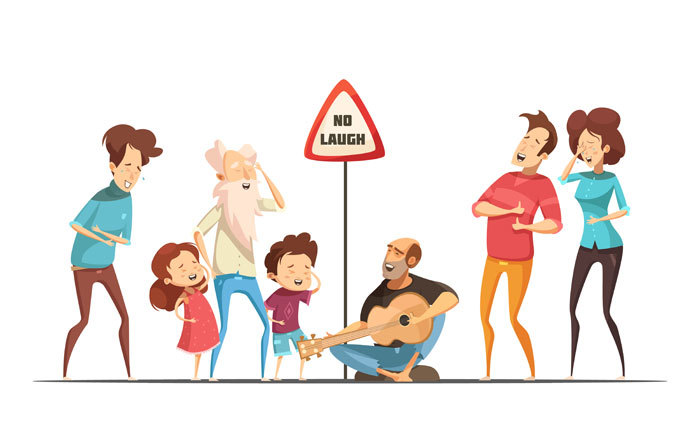
My friend Thomas once evaluated a speaker named Jerry. He joked: “Jerry must be very desperate to seek advice from his arch-enemy, Tom.” The audience burst out laughing - because Tom and Jerry.
Simple works best. You don’t want to appear to be trying too hard.

Ride on the Shoulders of Giants
I’m always surprised by how much impact a quote from a famous person could make in an evaluation.
A quote makes you sound more credible because it implies that the person who said it agrees with you.
It also impresses the audience because it appears as if you thought of it in the 5 min you had to prepare.
A good source of quotes when it comes to giving evaluations would be the World Champions of Public Speaking. An example would be the one from Lance Miller above.
Some non-Toastmaster speakers you could quote are Patricia Fripp, a well-known speaking trainer , Tony Robbins and Zig Ziglar.
When it comes to quoting, it must be related to the topic, credible and well-known enough.
When I evaluate an icebreaker speech, I would say:
“Zig Ziglar once said, “You don’t have to be good to start, you have to start to be good.” Congratulations on starting your journey to greatness.”
Use Stock Phrases
One way to impress the audience is to prepare a set of phrases that you could use for any evaluation.
Bonus points if they consist of alliterations.
Here are some examples from past District Champions:
“They say a picture paints a thousand words, but a masterful speech can paint a thousand pictures.”
“Just like the Picasso of public speaking, you delivered a speech that was surreal and vivid through your command of the English language.”
“Your speech has enlightened our minds, enliven our hearts and enrapture our souls.”
“Let me put on my creative lenses to evaluate your speech.”
“Her story was remarkable, rejuvenating and her message, resounding. What an exciting and engaging story she had for us today.”
You don’t want to overdo this though.
Video Evaluations
To help improve your chain of thoughts and ability to write fast, practice with videos of speeches.
There are thousands of Toastmasters videos on Youtube; from newbie speakers to World Champions.
Look for those that are 5 to 7 min, then practice as if it is a contest environment; only write during the speech and 5 min after.
Then give an evaluation right after.
Record yourself and evaluate your evaluation.
Challenge yourself and do it at 1.5x normal speed so you have less time to form your speech.
You can also practice by writing down evaluations for all speakers whenever you visit a club. You don’t have to give an actual verbal evaluation, but practice jotting down and forming your speech on the spot.

Break Down World’s Best Speakers
To learn how to evaluate advanced speakers, you have to evaluate advanced speakers.
Don’t have the chance to do it at a club meeting?
Then evaluate all the past World Champion speeches on Youtube.
Go deep, deconstruct the speech line by line and scrutinize every single action, facial expression, and stage movement .
Then zoom out to see how the story could be told better.
Think of ways on how the speech can be improved.
If you can find just one thing to make the speech better, I would consider that a successful attempt.
Practice, Practice, Practice
I can’t stress this enough. As cliche as it sounds, practice makes progress .
When I first started giving evaluations, I did it occasionally. I would go overtime, way undertime and had lots of pause fillers .
Ask one trainer and he would tell you to give 1 + 2 points. Ask another and he would say 2 + 3. Ask another and he would tell you to fit all your observations in 1 min, your suggestions in another minute , and to conclude in 1.5 min (doesn’t make sense to me).
My suggestion?
Forget all those and find your own timing.
Only by practicing, you know your pace. And once you are comfortable with your pace, then, you decide how many points to suggest.
It was only through lots of consistent practice that I understood my speaking pace. I found the right number of points I could make, without going overtime, but still gave enough value.
As a bonus, my pause fillers started going away and the words came naturally to me.
Practice makes progress.
Conclusion: The Most Definite Speech Evaluation Guide
I recently joined my first evaluation contest. It was a combined club contest between 4 clubs in the west of Singapore.
It was a super challenging one as the test speaker talked about how evaluations could be different.
Can you imagine? Evaluating a speaker talking about evaluations.
In a way, there was a slight pressure to ‘be different’ otherwise the speaker is proving his point - that all evaluations are the same.
Furthermore, he used Powerpoint slides . He didn’t tell a typical story and there wasn’t any chance for him to demonstrate vocal variety and body language.
I had prepared a whole bank of stock phrases, alliterations, acronyms and whatnot.
In the end, I used none of those. I freaked out a little, because I didn’t realize 5 min went by so fast.
What kicked in were the weeks of evaluation practice I had.
I went back to basics, applied the principals I shared on this post, and even though I felt it could be better, I won the contest.
I have since continued going around the island giving evaluations. This is a never ending process and I hope all these tips help you as much as they have helped me.
Related: How to Conduct a Speech Analysis
Comments are closed
Hey toastmaster.
The Skill of Crafting the Perfect Speech Evaluation
Hrideep barot.
- Public Speaking , Speech Writing , Toastmasters

When I was asked to give a speech evaluation, I thought to myself, “How difficult can this be? All I have to do is give some feedback.” And we ALL are GREAT at giving feedback, aren’t we? We’re great at solving the problems of other people.
But have you ever faced a situation where you have given someone “amazing” feedback and you wonder why they don’t listen to you or apply what you have recommended to them? Since most of us come from a background of criticism, I quickly realized that giving a speech evaluation is not really the same thing as giving generic feedback. Giving a good, helpful evaluation is not that easy.
A speech evaluation does not refer to a “sandwich” of commendation, mild recommendations followed by thoughtless encouragement (“Good luck in your next speech!”). A true speech evaluation refers to the ability to truly understand a speech and say things of value which actually help the speaker improve. At the end of it, that’s what public speaking is all about – saying something of value and helping someone improve.
How do you start a speech evaluation?
Rhetorical questions.
An easy way of connecting with the audience is to start your evaluation speech by asking questions. The question can be as simple as, “I thoroughly enjoyed John’s speech and could definitely relate to it. Wasn’t it?”
Quotes: A simple and effective way to start an evaluation.
For instance, Abraham Lincoln once said, “It’s not the years in your life that count. It’s the life in your years”. Dear fellow Toastmasters and guests, after listening to Jack’s speech I understood what it feels like to lead a purposeful life and add “life to the years”.
Another technique to start your evaluation speech is by adding lighthearted humor at the beginning of the speech.
For instance, if a speech is based on the speaker dealing with perfectionism, you could start your evaluation with, “After hearing Liam’s speech, one thing is clear to me…I will never go drinking to a bar with Liam, the perfectionist because the bar will never be set high enough.”
Cringy? I know…
Which is why it’s important to know your audience. You’ll be surprised how many times this line has people giggling for the remainder of the evaluation when delivered in front of the right audience.
References from the speech
Starting your evaluation speech with references from the speech not only makes you credible but also positions you as a good and attentive listener. However, it should be kept in mind to use these references in a creative way to make you stand apart from the rest.
For instance, for a speech on ‘Go Green’, the evaluation speech can begin with, “Toastmaster Jake has not only taught us to reuse, reduce and recycle but has also effectively used the principles of reuse, reduce and recycle in delivering speeches. He has reduced unnecessary stage movement, reused his vocal variety to create maximum impact and recycled our enthusiasm to go green.”
Finding the perfect speech opening line can be challenging as it needs to be attention-grabbing, quirky, and also give the audience a motive to listen to the rest of your speech. Read our extensively written article on 50 Speech Opening Lines (& How to Create Your Own) l The Ultimate Guide to get ideas on how to start your evaluation speech.
Before the speech
An evaluation is as good as the amount it actually helps the speaker you are evaluating. And to truly help the speaker, we must first understand what they want to be helped with.
Before the speech, approach the speaker, introduce yourself if you haven’t done so already and ask them if there is anything specific you would like them to observe in your speech. Perhaps there have been some constraints that the speaker may have faced in the past that they have addressed in this speech.
Knowing these things not only help you connect with the speaker but also raises your credibility in the eyes of the speaker. Think about it, if your evaluator came up to you before your speech and asked you these questions, wouldn’t you be happy that she is taking that small extra step to ensure that her evaluation is actually valuable to you?
This small step will help you be an effective evaluator even before the speech begins.
During the speech
It’s not about you.

When we are asked to evaluate on stage, the idea is to not only to help the speaker of course but also to let the other audience members benefit from the evaluation. But we should keep in mind that a speech evaluation (while it is technically a speech) is not your time to shine on stage. And many of us, myself included, tend to forget that. We tend to make our evaluations like speeches in itself.
And don’t get me wrong. There is nothing wrong in delivering an entertaining or well-spoken evaluation. The only thing to keep in mind is that our focus should be on one question only – how do I help the speaker improve? Your focus on delivery should not over-power the main reason of a speech evaluation, which is – to evaluate.
However, when giving an evaluation, don’t ignore the rest of the crowd. While your focus should be on your speaker, you should not ignore the rest of the crowd as well.
So instead of addressing just the speaker by saying “Your speech was structured really well”, you can address the entire crowd and say, “The speaker had beautifully structured her speech”.
Keep the Evaluation simple
This ties back to the previous point – we are not evaluating to impress anyone. It’s all about expressing your honest opinion of the speech in a fashion that best helps the speaker. So, there is no need to use big fancy words and try to show off about the things you know so well.
The most effective evaluations are simple. Because simplicity helps the speaker relate to your evaluation and they are much more likely to apply your recommendations when they truly understand them.
Where did you connect with the speech?
While evaluations tend to focus on the technicals of public speaking, we should not forget about building a connection with the speaker and her speech.
I learned this by one of my mentors. He told me, “When you go on stage to evaluate a speaker, the first few seconds should be spent on informing the speaker how her speech related to you. It will help establish a degree of credibility and validation to show that you really connected with the speech.”
For example, if someone spoke about sports, I would probably start off by saying that I too am a sports enthusiast and really connected/related to what the speaker said.
Any statement like this, even if it’s downright simple, which helps you connect with the topic, idea or message of the speech, will help.
Speak less, but with impact
Evaluations are supposed to be crisp and concise in nature.
The reason for this is that we do not want to overstuff the speaker with a whole bunch of recommendations which they will find hard to remember and apply.
Evaluation is most effective when it addresses one or two key areas that can be improved upon and specific actions the speaker can take to improve upon it.
So, focus on just one, two, or at the most three key areas your speaker can improve upon along with specific examples and call to actions as to how they can improve.
Validate your evaluation with appropriate reasons
The difference between a great evaluation as compared to a novice one is ‘ reasons’ .
When providing a recommendation or a commendation to someone, it’s important to back them with reasons and examples.
For instance, if an evaluator tells you that they did not like your speech ending and you should improve upon it, that’s not very helpful, is it?
But what if your evaluator tells you something along the lines of, “Your speech conclusion was something that could be worked upon. When you ended your speech, it seemed very abrupt. I personally, was not sure if the speech had actually ended or not. Maybe next time, you can try and make the ending a lot more evident – maybe end with summarizing the major points in your speech and a specific action that you would like the audience to take. It will help make your conclusion much stronger while helping the audience remember the major points in your speech.”
Wouldn’t this be way more helpful than simply saying, “I did not like the way your speech ended. You can improve upon it,”? We are not here to throw random opinions.
So, when you provide a recommendation, follow this process – state what can be improved upon, why it requires improvement and recommendations on how they can improve. It will make your argument much stronger and much more valuable.
The same process should be followed when giving a commendation as well. Don’t simply state what you liked about a speech. State why you liked it and maybe give a few examples from the speech to reinforce your point.
For example, instead of saying, “I liked the way you used voice modulation”, it would be more helpful to say something along the lines of, “I really liked your use of voice modulation. For instance, when you transitioned from the happy moment of your speech to the sadder moments, your tone of voice reflected that mood which helped create a much deeper impact.”
Know your speaker and their familiarity with public speaking
The evaluations that have helped me the most are the ones that address what I can improve upon with regard to what level I am on in my public speaking journey .
This is crucial.
If a speaker is giving a speech for the first time in her life, it wont make sense to tell her to improve her body language or voice modulation. Since she is new to the stage, it’s only natural that her body and voice will take time to adjust to the stage. The evaluation is just not helpful in that case.
Instead, if you can point one or two specific points that you believe a new speaker can improve upon, it would be so much more helpful.
For instance, when I gave my very first speech, my evaluator did not tell me to use more hand gestures or to be more “dynamic on stage”. That would not have been the most helpful advice considering I was so new to public speaking. He instead gave me one simple recommendation – to smile more.
Apparently, I was frowning a lot throughout my speech. “A few smiles will help lighten the speech up”, he said. This was useful to me. A simple recommendation, but one that I can easily work on and apply with regard to the level I am on in my public speaking journey .
Conclude on a positive note
Always conclude the evaluation on a positive note. I know, this is typical. But it really does help. Especially for new speakers, it leaves them feeling encouraged.
Ending on a positive note does not mean “I wish you all the very best for your future speeches.” It means reinforcing the fact that the speaker has taken the right decision by showing the courage to go up on a stage and speak. They are also much more likely to apply the feedback that was given to them if the evaluation ends on a positive note.
Don’t forget to enjoy the speech
While evaluating a speech, it’s easy to get lost in the evaluation process. You might be taking down notes, you might be trying to come up with what the speaker is doing right or wrong, etc. In all of this, we forget something very important – to actually enjoy the speech.
This does not mean you don’t take down notes. It simply means you don’t have to be so engrossed in taking notes that you miss a lot of what the speaker is saying.
I’ve seen this happen a few times – where an evaluator is just writing, writing and writing while her speaker is on stage. Then, when she does go to evaluate – she has missed out on a large portion of the speech simply because she was too caught up in taking down notes as opposed to actually listening to the speech.
Try to enjoy the speech, absorb it. It will help you understand the true essence of the speech that go beyond content and delivery. Then, your evaluation will be so much more effective and relevant .
After the evaluation
Effective evaluators do not consider their job done after they have delivered their speech evaluation. After the evaluation ends, go up to the speaker and ask her if she related to the evaluation. Ask her if there was something else she would like to know in terms of what she could improve upon or what she did particularly well.
This helps clear any miscommunication as well as gives you the opportunity to provide further comments that you could/did not say in your evaluation speech.
Speech Evaluations at Toastmasters
If you’re wondering how to deliver an evaluation in a Toastmasters meeting, the same tips apply. In Toastmasters, to give a valuable evaluation, despite the points stated above, you must also keep the speech objectives as the core focus of your evaluation. If someone is delivering a speech where their objective is related to speech structuring, don’t spend time commenting on their body language or tone of voice.
How long are speech evaluations in Toastmasters?
You typically have 2 to 3 minutes to give an evaluation in Toastmasters. Use them effectively and make sure your comments are in line with the objectives of the project your speaker is delivering.
Evaluating an Ice-Breaker speech
An ice-breaker speech is the first speech a Toastmaster member delivers.
To gain in-depth knowledge about what exactly is an icebreaker and how to write one, read our article on Delivering a Fiery Icebreaker at Toastmasters: Holistic Guide & Sample Speeches as it contains the A to Z details of an icebreaker.
The first thing to keep in mind when evaluating one is that it is the first speech, as mentioned above. The speaker is probably coming on stage for the first or second time. Their main job which added the most value to them was simply coming up on stage and attempting to deliver a speech.
Even if the speech was absolutely terrible, the fact that someone decided to tackle their fear of public speaking is an achievement in itself. So commend them on that.
Make them feel good that they finally came upon a stage. A good chunk of your evaluation should focus on what they did good and how they can leverage their strengths. I am by no means saying that you should be fake or overly positive about this.
But ice-breakers don’t call for harsh evaluations because the speaker did what he/she was supposed to do – go up on stage and introduce themselves.
When evaluating an ice-breaker, the major mistake I see evaluators making is providing very generic feedback that can be applied to any speech.
Things like body language, voice modulation, stage movement, eye contact, etc. are not things to suggest to improve for ice-breakers. These things are life-long public speaking learnings which take time to be worked on. When someone is delivering their first speech, of course, they won’t be proficient with their body or voice.
So it does not make sense to suggest these pointers in an ice-breaker evaluation. So what do you talk about?
Reflect on their speech small tweaks they can make to their speech to make it better right from the get-go. That means providing recommendations which won’t take them time to implement. Small tweaks that they work on right away to improve their speech can be amazingly helpful.
For instance, if a speaker spoke about her life journey – don’t tell her that she could have used the stage better. Tell her that she could have probably added more depth into her speech by telling the audience about one major event that got her to be the person she is today.
It’s something the speaker can improve upon from the get-go.
Here’s a great example of Toastmaster evaluation from a champion evaluator:
To know more tips about evaluating an icebreaker, read our extensively written article on How to Evaluate an Icebreaker? (Tips and Sample Evaluation) .
What to expect when you are getting evaluated?
We understand a great deal about evaluations when we get evaluated ourselves. When you’re about to be evaluated by another speaker (especially at Toastmasters) don’t expect some life-changing advice.
I mean, don’t get me wrong. The evaluation can prove to be very valuable.
But the thing is you might not always know who your evaluator is. Unless they themselves are credible speakers, the evaluation provided can be incorrect or downright useless.
When being evaluated, have an open mind. But also use a filter.
If you know the speaker giving the evaluation is not very credible, still hear them with an open mind. But make sure you go to a speaker you look up to who would be present in the audience and ask them for a personal, informal evaluation as well.
Another thing to keep in mind is that an evaluator is usually always good-intentioned. They will be wanting to help you but might provide you light criticism as they feel they may hurt you.
So if you felt the evaluation was a bit too “nice”, if you want raw and honest feedback, go to your evaluator after your speech and ask them in person – is there anything else you could improve upon? Tell them that they can be blunt if they like – in the end, the more honest the evaluation, the more you can grow as a speaker.
Apply this to your evaluation as well. When you provide an evaluation, think about it as if you were the speaker. What would you benefit the most from hearing? It will help you give a more relevant and action-driven evaluation.
Speech evaluation sample script
Speech being evaluated:
Hello everyone, and Hello to ______ (name of your speaker) in particular. I remember reading this somewhere, “And suddenly you just know it’s time to start something new and trust the magic of beginnings.” This is your magical beginning, [NAME]. Congratulations on taking your first step.
Getting to your evaluation…let’s start with the commendations. Your speech was enjoyable. I especially liked how you began by explaining to us the perils of having a lesser-known name. As someone who has the same last name, I could totally relate to that bit. Using self-deprecating humor right at the start is a very powerful technique to ease the audience into listening to you and staying with you throughout the speech. Well done with that.
I also liked the humility used in your voice. Even when the achievements were being stated, it was balanced well with your mistakes and an understanding of the fact that even when things are going well, they can go dark at any time.
Humour and humility are your strengths that stand out right off the bat. It’s something that we need to hone further to amplify.
Getting to your recommendations…
There seemed to be a consistent pace in your voice. This can lead to monotony. A simple to stop that is to sprinkle in a few pauses. Considering that you used the literary device of self-deprecating humor a couple of times, it could have been paired with pausing. This would have generated a greater impact.
That was something technical. But on a more fundamental level, the purpose of an Icebreaker is to introduce yourself to the audience which you did but instead of just dropping snippets of your life and whetting our appetite, what you could have done is shared one, two or three key stories from your life.
A good speech always consists of interesting anecdotes. You could have spoken about an incident from school perhaps where your lesser-known name got you into some funny situation.
You could have also elaborated on the aspect of how you fell in love with music, maybe talk about your first tryst with it. We would have loved to hear about how you helped build your college’s first music society as well. You see, three narratives and you would have left us mesmerized.
But these are things that come with time. Right now, the speech was delivered with ease and didn’t seem like it was done so by a first-time public speaker.
I believe that if we continue to focus on your strengths and add in some powerful elements of pausing and narrative structures, I have no doubt that you will be able to take your speech from good to great.
All the Best and looking forward to more speeches from you.
Beyond the stage
Learning to become an effective speech evaluator is something that helps build a critical skill when it comes to communication – the art of criticism . Sometimes, even if your intentions are good, most people are thin-skinned and can get easily upset when they receive criticism.
But applying the principles of speech evaluations – focusing on the other person instead of yourself, validating your positive and negative points with reasons, concluding on a positive note – the way you communicate criticism to your boss, colleague, subordinate, etc. can be very, very effective.
Remember, giving criticism is a skill. It can be mastered through practice and speech evaluations are an amazing way to practice just that!
Enroll in our transformative 1:1 Coaching Program
Schedule a call with our expert communication coach to know if this program would be the right fit for you

10 Hand Gestures That Will Make You More Confident and Efficient

Interrupted while Speaking: 8 Ways to Prevent and Manage Interruptions

Speak English Like a Pro at the Workplace

- [email protected]
- +91 98203 57888
Get our latest tips and tricks in your inbox always
Copyright © 2023 Frantically Speaking All rights reserved
Kindly drop your contact details so that we can arrange call back
Select Country Afghanistan Albania Algeria AmericanSamoa Andorra Angola Anguilla Antigua and Barbuda Argentina Armenia Aruba Australia Austria Azerbaijan Bahamas Bahrain Bangladesh Barbados Belarus Belgium Belize Benin Bermuda Bhutan Bosnia and Herzegovina Botswana Brazil British Indian Ocean Territory Bulgaria Burkina Faso Burundi Cambodia Cameroon Canada Cape Verde Cayman Islands Central African Republic Chad Chile China Christmas Island Colombia Comoros Congo Cook Islands Costa Rica Croatia Cuba Cyprus Czech Republic Denmark Djibouti Dominica Dominican Republic Ecuador Egypt El Salvador Equatorial Guinea Eritrea Estonia Ethiopia Faroe Islands Fiji Finland France French Guiana French Polynesia Gabon Gambia Georgia Germany Ghana Gibraltar Greece Greenland Grenada Guadeloupe Guam Guatemala Guinea Guinea-Bissau Guyana Haiti Honduras Hungary Iceland India Indonesia Iraq Ireland Israel Italy Jamaica Japan Jordan Kazakhstan Kenya Kiribati Kuwait Kyrgyzstan Latvia Lebanon Lesotho Liberia Liechtenstein Lithuania Luxembourg Madagascar Malawi Malaysia Maldives Mali Malta Marshall Islands Martinique Mauritania Mauritius Mayotte Mexico Monaco Mongolia Montenegro Montserrat Morocco Myanmar Namibia Nauru Nepal Netherlands Netherlands Antilles New Caledonia New Zealand Nicaragua Niger Nigeria Niue Norfolk Island Northern Mariana Islands Norway Oman Pakistan Palau Panama Papua New Guinea Paraguay Peru Philippines Poland Portugal Puerto Rico Qatar Romania Rwanda Samoa San Marino Saudi Arabia Senegal Serbia Seychelles Sierra Leone Singapore Slovakia Slovenia Solomon Islands South Africa South Georgia and the South Sandwich Islands Spain Sri Lanka Sudan Suriname Swaziland Sweden Switzerland Tajikistan Thailand Togo Tokelau Tonga Trinidad and Tobago Tunisia Turkey Turkmenistan Turks and Caicos Islands Tuvalu Uganda Ukraine United Arab Emirates United Kingdom United States Uruguay Uzbekistan Vanuatu Wallis and Futuna Yemen Zambia Zimbabwe land Islands Antarctica Bolivia, Plurinational State of Brunei Darussalam Cocos (Keeling) Islands Congo, The Democratic Republic of the Cote d'Ivoire Falkland Islands (Malvinas) Guernsey Holy See (Vatican City State) Hong Kong Iran, Islamic Republic of Isle of Man Jersey Korea, Democratic People's Republic of Korea, Republic of Lao People's Democratic Republic Libyan Arab Jamahiriya Macao Macedonia, The Former Yugoslav Republic of Micronesia, Federated States of Moldova, Republic of Mozambique Palestinian Territory, Occupied Pitcairn Réunion Russia Saint Barthélemy Saint Helena, Ascension and Tristan Da Cunha Saint Kitts and Nevis Saint Lucia Saint Martin Saint Pierre and Miquelon Saint Vincent and the Grenadines Sao Tome and Principe Somalia Svalbard and Jan Mayen Syrian Arab Republic Taiwan, Province of China Tanzania, United Republic of Timor-Leste Venezuela, Bolivarian Republic of Viet Nam Virgin Islands, British Virgin Islands, U.S.

IMAGES
VIDEO
COMMENTS
Summarise the 5 points in the body of the speech i. Close with a positive remark to the speaker In a 3 minute time slot for evaluation, then aim to begin recommendations before or by the white light (2 minutes), and begin your last commendation once you see the orange light (2 ½ minutes). SPEECH EVALUATION 7.
Whether you are a new Toastmaster starting your evaluation journey, or an experienced one looking to win the speech evaluation contest, this guide is for you. The first part covers general tips on being a more effective evaluator in a Toastmaster club meeting and the second part covers tips for winning the evaluation contest.
But applying the principles of speech evaluations – focusing on the other person instead of yourself, validating your positive and negative points with reasons, concluding on a positive note – the way you communicate criticism to your boss, colleague, subordinate, etc. can be very, very effective.